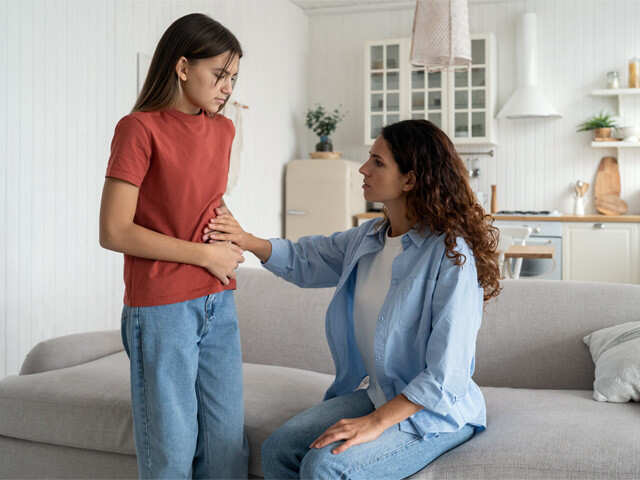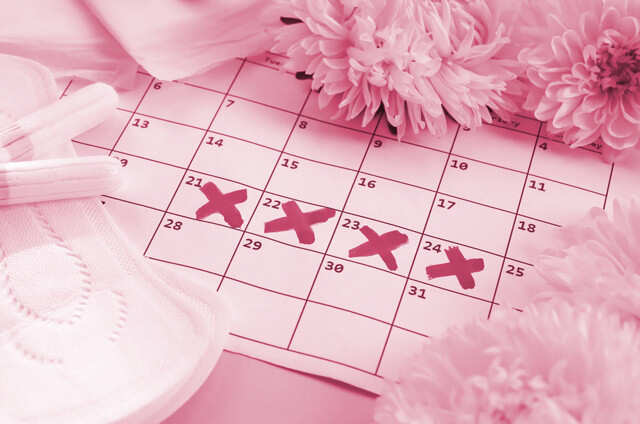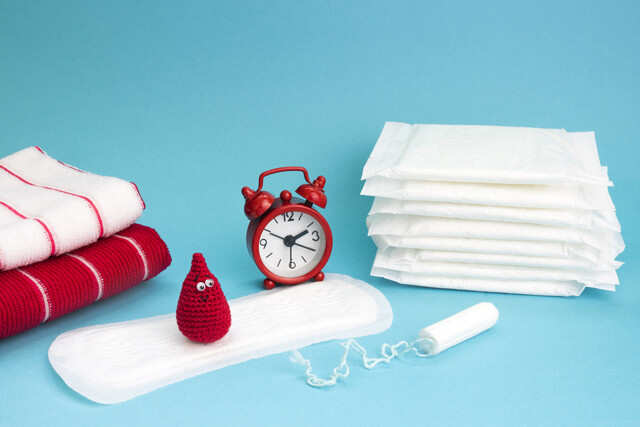
Image: Shutterstock
Embarking on the journey of womanhood brings along significant changes and milestones. One such important phase in this process is the arrival of your first period. Experiencing a change, both physically and mentally, which needs to be approached with knowledge and preparedness. Recognising the early signs and having effective self-care strategies in place can make this transition smoother and comfortable. Dr Rubina Shanawaz Z, Senior Consultant, Fortis Hospital, Bengaluru shares valuable insights to help one navigate through this new phase of their life.
When can I expect my first period?
The average age for the onset of the first period, also known as menarche, typically falls between 10 and 12 years. However, the timing may vary depending on individual factors. If you have a higher body mass index (BMI), your first period may start earlier than average. Also, if you are underweight, experiencing stress, or facing hormonal imbalances, your first period may be delayed.
The initial signs of puberty usually manifest as breast growth, followed by the growth of underarm and pubic hair, along with an increase in height and changes in body shape. Approximately two years after the first signs of puberty appear, you can anticipate the commencement of your first period. The timeframe for this can range from six months to three years.
If you have experienced other signs of puberty but have not started menstruating by the age of 15, it is advisable to consult a gynecologist. The doctor will conduct a thorough examination and may request relevant investigations such as ultrasound scans and blood hormone assays to better understand the situation. It is important to seek medical guidance in such cases to ensure your well-being and address any potential concerns.
 Image: Shutterstock
Image: Shutterstock
What are the early signs?
Apart from the growth of breasts, pubic and underarm hair with growth spurt which happen over a span of 2-3 years, the immediately preceding signs mostly include (but not always a dictum),
· Increased watery vaginal discharge
· Lower abdominal cramps
· Acne
· Abdominal bloating
· Extreme mood swings
What colour will my first period be?
The colour can vary from dark brown to bright red to dark red.
How much can I expect to bleed?
The nature of the first period can vary from mild spotting to slightly heavier flow with small clots.
How long will my first period last?
The first period can differ among girls, with some experiencing only light spotting for a few days, while others may have a longer period lasting up to a week. On average, periods typically last between 2 to 7 days.
During the initial three years after menstruation begins, both the length of menstrual flow and the time between periods can vary. It is normal for periods to occur once every 2-3 months or even with longer intervals during this period. These fluctuations are part of the body's adjustment to the hormonal changes that accompany puberty.
Consult your gynecologist if:
· There is continuous bleeding for more than 7 days
· The gap between two periods is less than 20 days
· You feel dizzy/tired
· You experience unbearable pain during periods
· Delayed periods with more than a 45-60 day gap even after 2-3 years from the first period.
 Image: Shutterstock
Image: Shutterstock
Self-care a must
When you experience your first period, it's important to take immediate action if you notice blood after using the toilet or if your clothes become stained. As a temporary measure, you can use absorbent materials such as tissue paper and place it in your underwear. It's crucial to inform a trusted adult about what you're going through so they can provide you with further guidance and support.
When it comes to managing your menstrual flow, there is a wide range of options available based on personal preferences. These include period underwear, sanitary napkins, tampons, and menstrual cups. It's essential to educate yourself about the advantages and disadvantages of each option. You can experiment with a couple of different products to see which one suits your lifestyle and needs the best. By exploring these choices and gaining familiarity with them, you can make an informed decision on the most suitable menstrual hygiene product for you.
Cramps
Cramps are natural during the initial phase, and there is always home remedies that work wonders:
· Use a hot water bag on the lower abdomen.
· Drink warm fluids.
· Keep yourself physically active.
· Use over the counter pain killers only on the advice of a physician.
Menstrual Hygiene
There are certain hygiene practices that needs to be followed during your period, such as:
· Change your pad every 3-4 hours even if not fully soaked /empty your menstrual cup every 6-8 hours without fail.
· Be prepared for leaks initially and have extra sanitary products.
· Wash the pubic area only externally and do not attempt to douche (clean the inside of the vagina). Douching can lead to vaginal infections due to change in the ph value of the vaginal fluids.
· Track your periods in a journal/on an app to identify any irregularity.
· Remember that pregnancy is a possibility and be aware of your reproductive health.
Armed with the right information, one can understand the body at its best!
Also Read: Ways To Approach Conversations With Your Child About Periods
Embarking on the journey of womanhood brings along significant changes and milestones. One such important phase in this process is the arrival of your first period. Experiencing a change, both physically and mentally, which needs to be approached with knowledge and preparedness. Recognising the early signs and having effective self-care strategies in place can make this transition smoother and comfortable. Dr Rubina Shanawaz Z, Senior Consultant, Fortis Hospital, Bengaluru shares valuable insights to help one navigate through this new phase of their life.
When can I expect my first period?
The average age for the onset of the first period, also known as menarche, typically falls between 10 and 12 years. However, the timing may vary depending on individual factors. If you have a higher body mass index (BMI), your first period may start earlier than average. Also, if you are underweight, experiencing stress, or facing hormonal imbalances, your first period may be delayed.
The initial signs of puberty usually manifest as breast growth, followed by the growth of underarm and pubic hair, along with an increase in height and changes in body shape. Approximately two years after the first signs of puberty appear, you can anticipate the commencement of your first period. The timeframe for this can range from six months to three years.
If you have experienced other signs of puberty but have not started menstruating by the age of 15, it is advisable to consult a gynecologist. The doctor will conduct a thorough examination and may request relevant investigations such as ultrasound scans and blood hormone assays to better understand the situation. It is important to seek medical guidance in such cases to ensure your well-being and address any potential concerns.

What are the early signs?
Apart from the growth of breasts, pubic and underarm hair with growth spurt which happen over a span of 2-3 years, the immediately preceding signs mostly include (but not always a dictum),
· Increased watery vaginal discharge
· Lower abdominal cramps
· Acne
· Abdominal bloating
· Extreme mood swings
What colour will my first period be?
The colour can vary from dark brown to bright red to dark red.
How much can I expect to bleed?
The nature of the first period can vary from mild spotting to slightly heavier flow with small clots.
How long will my first period last?
The first period can differ among girls, with some experiencing only light spotting for a few days, while others may have a longer period lasting up to a week. On average, periods typically last between 2 to 7 days.
During the initial three years after menstruation begins, both the length of menstrual flow and the time between periods can vary. It is normal for periods to occur once every 2-3 months or even with longer intervals during this period. These fluctuations are part of the body's adjustment to the hormonal changes that accompany puberty.
Consult your gynecologist if:
· There is continuous bleeding for more than 7 days
· The gap between two periods is less than 20 days
· You feel dizzy/tired
· You experience unbearable pain during periods
· Delayed periods with more than a 45-60 day gap even after 2-3 years from the first period.

Self-care a must
When you experience your first period, it's important to take immediate action if you notice blood after using the toilet or if your clothes become stained. As a temporary measure, you can use absorbent materials such as tissue paper and place it in your underwear. It's crucial to inform a trusted adult about what you're going through so they can provide you with further guidance and support.
When it comes to managing your menstrual flow, there is a wide range of options available based on personal preferences. These include period underwear, sanitary napkins, tampons, and menstrual cups. It's essential to educate yourself about the advantages and disadvantages of each option. You can experiment with a couple of different products to see which one suits your lifestyle and needs the best. By exploring these choices and gaining familiarity with them, you can make an informed decision on the most suitable menstrual hygiene product for you.
Cramps
Cramps are natural during the initial phase, and there is always home remedies that work wonders:
· Use a hot water bag on the lower abdomen.
· Drink warm fluids.
· Keep yourself physically active.
· Use over the counter pain killers only on the advice of a physician.
Menstrual Hygiene
There are certain hygiene practices that needs to be followed during your period, such as:
· Change your pad every 3-4 hours even if not fully soaked /empty your menstrual cup every 6-8 hours without fail.
· Be prepared for leaks initially and have extra sanitary products.
· Wash the pubic area only externally and do not attempt to douche (clean the inside of the vagina). Douching can lead to vaginal infections due to change in the ph value of the vaginal fluids.
· Track your periods in a journal/on an app to identify any irregularity.
· Remember that pregnancy is a possibility and be aware of your reproductive health.
Armed with the right information, one can understand the body at its best!
Also Read: Ways To Approach Conversations With Your Child About Periods
Next Story